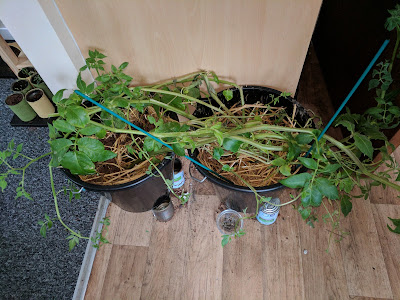Nobody could be happier than I am to see the progression of "minimalism" into a mainstream trend. I have an aversion to anything fashionable - an aversion, I am loath to admit, that I have cultivated a little too carefully, in a manner than verges on the hipsterish - but minimalism, I think, really is something different. Unlike a mere fashion, which is a phenomenon that always occurs within the confines of a consumerist framework, minimalism represents something genuinely challenging to our way of life. Still inside a consumerist culture, what could be more radical than not consuming? "The system", whatever exactly that is, cannot entirely incorporate its opposite.
Or can it?
We have become so used to abundance that any kind of self-restraint or self-sufficiency can seem perverse. Why grow your own vegetables when they are so readily available in the supermarkets? Why fix anything when it can replaced more cheaply? These are legitimate questions; they really are.
My aversion to the more vulgar, self-aggrandising aspects of minimalism, has something to do with what I call "frugal fetishism". In the (always glamorised) past, our predecessors were frugal mostly not by choice, but by necessity. Necessity is never fashionable. If instagram did not exist, it would not have been necessary to invent it. Which explains exactly why it was invented. Early 1950s housewives wouldn't have added twenty-five hashtags to pictures of their ration books or grocery "hauls".
If capitalism manages to absorb minimalism, it will do so with hashtags.
There is something perverse about wearing your minimalist credentials on your sleeve. This is a "minimalist" living space:
It is too easy to over-think all of this. "Minimalism" certainly has many positives:
1. Less clutter means less distraction. The fewer things you own, the less time (and money) you have to spend looking after them, cleaning them, maintaining them, upgrading them. Fewer things, more free time. It's a simple equation.
2. Less distraction means more peace of mind. Humans, I do not think, are supposed to multi-task. At least, we haven't yet evolved to multi-task well.
3. More peace of mind means more peace. When twentieth century feminists, hippies and other radicals started to realise that "the personal is political", this is what they meant. Stuff - particularly private property, ownership, forces you inward. Culture will tell us that self-expression is possible only through property, through the maximisation of individuality. Minimalism challenges this conception.
4. More peace means less violence. Well, yes, obviously. There is a certain kind of "violence" that never hurts anyone.
5. There is no number 5.
Minimalism challenges us because it frees up time. Working ourselves half to death provides a distraction that is often welcome. We are told that work gives life "meaning", a sense of purpose. Minimalism could be the acknowledgement that we have no purpose, and that that's OK. The meaning of life is simply to live it.
Boredom is terrifying. That is a good thing.
If you enjoyed this post, please like, +1, share, subscribe and all that sort of thing. I welcome comments and discussion. You might want to follow me on Facebook, Twitter, Tumblr or Google+. Posts from this blog also appear in all of those places, alongside other stuff.
Please consider disabling your adblockers when reading this site. I make every effort to ensure no inappropriate, rubbish or offensive advertising appears here, and nothing that is contrary to the spirit of this blog. So it's really nothing to be afraid of. Cheers.



































